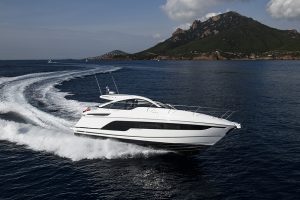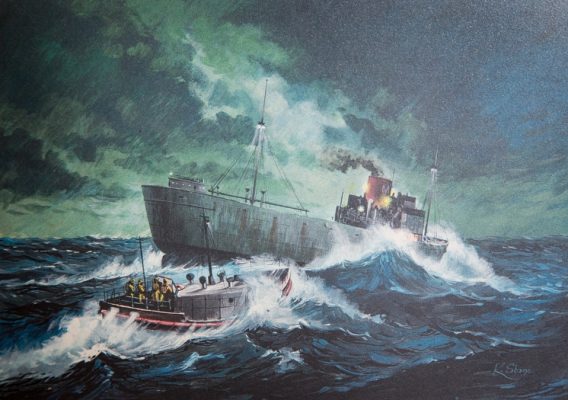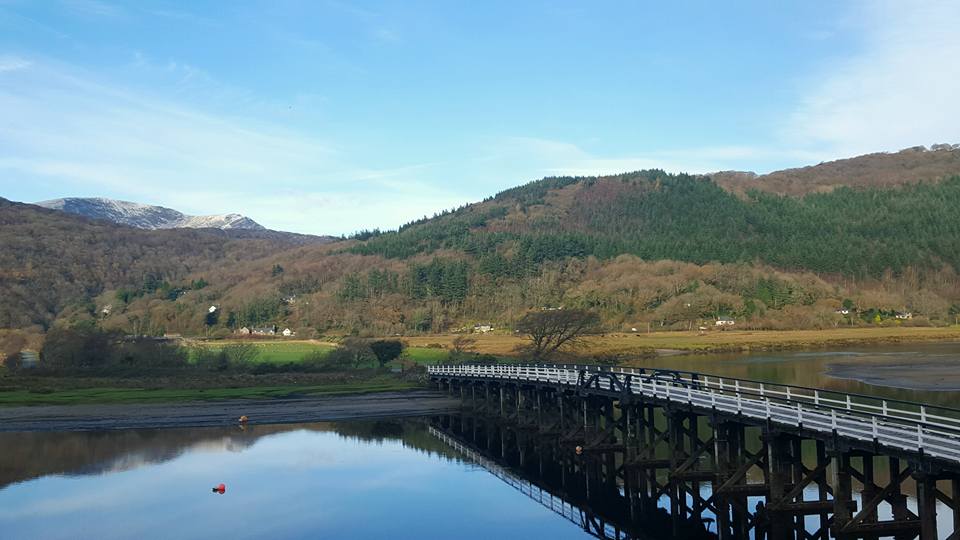Nafsiporos survivor gives moving message of thanks to rescuers 50 years on
It is 50 years ago today that the crew of the Greek cargo ship, Nafsiporos gave up all hope in hurricane conditions off Anglesey. That was until RNLI crews came to their aid.
A survivor from one of the most remarkable rescues in the RNLI’s 192-year history has given a moving thanks to his Welsh rescuers – 50 years to the day after his life was saved.
On 2 December 1966, lifeboat crew volunteers from north Wales carried out the rescue of the Greek cargo ship, Nafsiporos, off the Anglesey coast.
It remains one of the most decorated rescues in the RNLI’s history – with all 17 crew on board the Holyhead and Moelfre lifeboats awarded rare medals for gallantry.
Crews from the neighbouring Anglesey lifeboat stations risked their lives battling waves as big as houses and 100mph winds to pluck Greek sailors to safety from the wildly listing 1287-ton Nafsiporos, which was drifting dangerously towards rocks north of Anglesey.

Greek vessel Nafsiporos adrift in the Irish Sea. Credit: RNLI
Greek survivors told of losing all hope in the mountainous December seas before hearing a message from the Holyhead lifeboat crew: “It’s Christmas time and you will see your ladies and babies for Christmas.”
A total of 15 Greek sailors were rescued from the Nafsiporos by the volunteer lifeboat crews.
Despite the hurricane conditions, nobody lost their lives in a rescue mission lasting 24 hours.
To mark the 50th anniversary, five of the surviving Holyhead lifeboat crew members from the rescue – Graham Drinkwater, Eric Jones, Jackie Hughes, Will Jones and Brian Stewart – have received a moving message of thanks from the Nafsiporos’ Second Officer, Anestis Rokopoulos during a special ceremony at Holyhead.
Now 73, Anestis told his rescuers: “My only message is thank you. I am alive only because of these people. I make a family and I make grandchildren only because of these people.”

Nafsiporos’ Second Officer Anestis Rokopoulos, now 73 with his family. Credit: RNLI
Remembering the conditions at sea 50 years ago, he added: “We had no control and no steering. The rocks looked like knives. Then from the depths of the sea came these boats and we said ‘they have come for us’.”
Drinkwater, Holyhead RNLI’s current lifeboat operations manager, was only 19 at the time of the Nafsiporos rescue.
It was his first ever lifeboat shout and he earned a Bronze Medal for Gallantry.
“It is fantastic to hear from Anestis today and his message of thanks means a great deal to us. To hear that the Greek sailors went on to live long and happy lives makes us all extremely proud,” he said.
Looking back at the rescue, Drinkwater added: “As a first shout as a teenager it certainly isn’t one I’ll ever forget. But lifeboat volunteers don’t go out to be gallant or to save the world, it’s just part of your life – you just do it.”

Moelfre RNLI lifeboat coxswain Dic Evans and the rescued Greek sailors. Credit: Liverpool Daily Post and Echo
“I remember the first moment I saw the ship. It was so massive compared to our boat. I got a bit apprehensive at that moment. We missed the first time, went round again, had a massive collision with the side of the Nafsiporos and then we were alongside,” he stated.
There were other difficult moments. The lifeboat of the Nafsiporos broke loose and swung like a pendulum above the Holyhead crew.
The Greek crewmen had to climb down a ladder on the side of their boat, dodging the dangerously swinging lifeboat, and then leap to the RNLI boat, which was also being lifted and dropped more than 20ft by the huge seas.
Five Greek sailors made it to safety before the swinging lifeboat fell, crashing onto the Holyhead lifeboat. Miraculously nobody was hurt.

Holyhead lifeboat operations manager Graham Drinkwater. Credit: RNLI
Now it was the turn of Moelfe lifeboat, Watkin Williams, under the command of coxswain Dic Evans.
“That day, the sea was like a foreign country. With the leaping and the plunging of the lifeboat, the compass was swinging wildly, I could see nothing. The sea was being blown into clouds of spray and visibility was nil,” he recalled.
“The waves were like nothing I’d ever been told about. We climbed perpendicularly and we went down the same way. I was afraid every wave was going to send us somersaulting on our back. There would have been no hope for any of us then, we would have disappeared forever,” he added.
Coxswain Evans on the Moelfre boat had witnessed the near disaster to the Holyhead lifeboat.
He then manoeuvred his 42-foot lifeboat alongside the Nafsiporos and his crew tried to pull the Greek sailors onboard.
Years later, survivor John Patsoulas would remember the Moelfre lifeboat crew standing in formation on the lifeboat’s decks, linking their arms shoulder to shoulder waiting to receive the sailors.
He and other men rescued by the Moelfre boat clearly recalled lifeboatman David Evans, coxswain Evans’ son, as a “bear of a man …big, strong and powerful” who grabbed the sailors and tossed them into the safety of the lifeboat “like sacks of corn.”
Coxswain Evans kept his boat steady enough for his crew to pull ten of the Nafsiporos crew onto the lifeboat’s deck.
On the tenth attempt, the Watkin Williams was swept onto the deck of the Nafsiporos, but was washed off moments later.
The Moelfre boat was badly damaged and without electrics and lighting, but set course for Holyhead to land the ten survivors.
Four Greek crewmen, including the captain were still on board the Nafsiporos, having refused to abandon ship.

Crew of the Holyhead lifeboat St Cybi, who were involved in the Nafsiporos rescue. L-R: Brian Stewart, Will Jones, Graham Drinkwater, Eric Jones, and Jack Sharpe. Credit: RNLI
By the time they arrived ashore, coxswain Evans, then aged 61, had been at an open wheel exposed to the hurricane conditions for nearly 13 hours without a break.
The Holyhead crew paused only to have a cup of tea then launched again to stand by the Nafsiporos through the night until a Dutch tug towed the cargo ship, and its remaining crew, back to Liverpool the following morning.
The determination and gallantry of both crews ensured the rescue was a huge success.
The RNLI awarded medals to every member of the Holyhead and Moelfre crews for their bravery.
Coxswain Dic Evans received his second RNLI Gold Medal and RNLI inspector Harold Harvey, was awarded his first.
During the rescue, he had taken on the position of acting Coxswain of the Holyhead boat.
Silver Medals were given to motor mechanic Evan Owens, coxswain Thomas Alcock and motor mechanic Eric Jones, and Bronze Medals were awarded to the remaining members of both crews.
Harold Harvey said afterwards: “We were all exhausted after 22 hours at sea, and during the night following the rescue many thoughts and silent prayers occupied our minds.”
“Once ashore, the rum came out. We were all proud and grateful men, speaking little and bound by the experience of such extreme lifeboat drama and action.”
Seven dead, one missing in New Zealand charter boat disaster
The search continues for a missing fisherman following the disappearance of the charter boat, Francie, as it tried to re-enter…
Service to mark 50th anniversary of Penmaenpool boat disaster
One of the worst boating tragedies in North Wales, the Penmaenpool boat disaster, resulted in the deaths of 15 people,…
Sinking ARC yacht: crew saved
Five crew were evacuated after the BM39 yacht started sinking, just days after starting the Atlantic Rally for Cruisers (ARC)…












